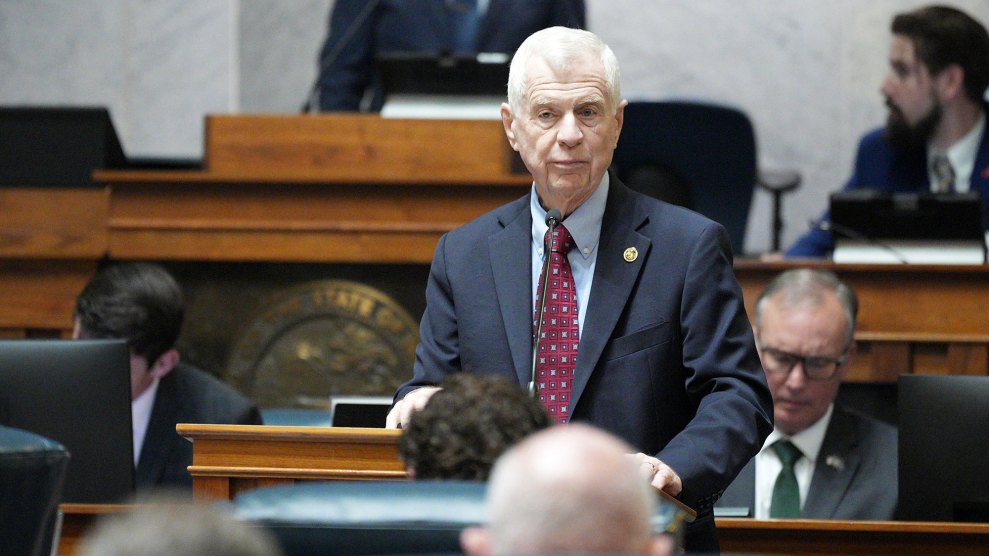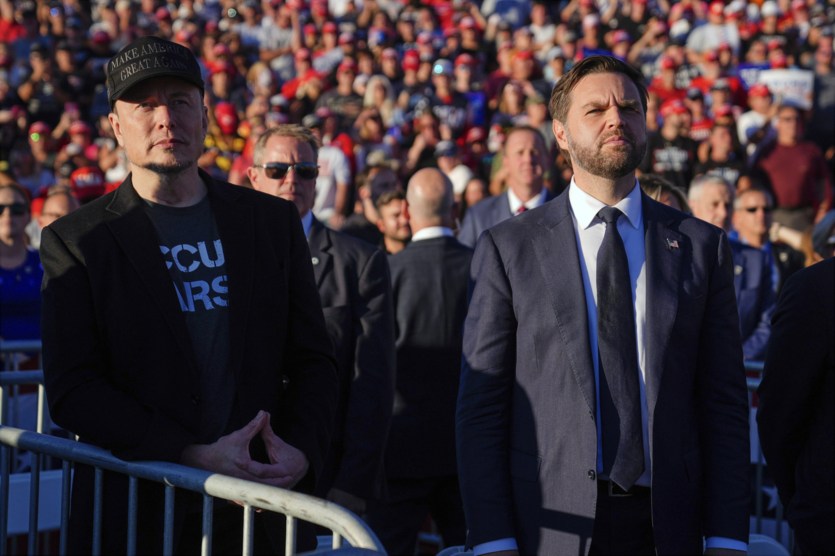
In the months since John Kerry’s defeat last November, asking “What’s wrong with liberals?” has become something of an obsession for pundits across America. Did they lose because they were crushed by the right-wing attack machine, because of those ever-nebulous moral values, because they were soft on national security, or because they hadn’t bashed corporations enough? Some of these? All of these? In Return of the “L” Word: A Liberal Vision for the New Century, Douglas Massey takes a long, hard look at these questions and comes up with some surprising answers. His book reminds us of just how much liberalism has accomplished over the 20th century, of why it eventually declined, and what liberals need to do to usher in a new realignment in politics, one that wrestles the country back from the now-dominant right.
Part of the answer, Massey contends, is to create a new market-based vision for liberalism, one that avoids the pitfalls of both conservative free-market dogma and the leftist ideologies of old. Building off insights from the rapidly-expanding field of economic sociology, Massey argues that markets are essentially human constructions, and liberals shouldn’t seek to oppose markets with big government, but rather, ensure that these markets are working in the public interest. “The time has come,” he writes, “for liberals to tell the public that markets are not ‘free,’ but human-created institutions that citizens have a right to supervise and mange for their own benefit. Liberals need to abandon their lingering hostility toward market mechanisms, embrace them, and substitute a new rhetoric of ‘democratic markets’ for the false metaphor of the ‘free market.'”
Massey, the Professor of Sociology and Public Affairs at Princeton University, recently sat down with Mother Jones to discuss his vision for a new liberalism.
Mother Jones: Your book is about the possibility of bringing liberalism back into American politics. I’d like to start off by asking how you would define liberalism, broadly conceived.
Douglas Massey: Well, for me, liberals are people who seek to use government to promote the general welfare. The United States, after all, was founded by men of liberal sentiment who were seeking to promote the greatest good for the greatest number, by creating a constitutional order for the creation and expansion of liberty. And that order was imperfect at first, but then in the 20th century liberals succeeded in enfranchising, in a very real way, the vast majority of Americans and pushed that project forward.
MJ: Now after a long string of successes in the 20th century—from the early Progressives, to the New Deal, to the civil rights movement, to Lyndon B. Johnson’s Great Society—why do you think liberalism reached a peak and started to decline somewhere in the 1960s?
DM: By the 1960s, liberal Democrats had been in power a long time, and they got arrogant, and really started taking a lot of their constituents for granted. In particular, a couple of things that came to a head. The civil rights movement really came to fruition in the late ’60s and led to a re-writing of the rules of the American political economy in a way that would enfranchise African-Americans. Now in doing so, it necessarily imposed some costs on people who had benefited under the old order. In particular, the white working classes were called upon to make certain economic sacrifices. And I think the liberal elites saw any resistance to these social changes, among the working classes, as simple racism and hence dismissed it. But the working class was really being called upon to make some economic sacrifices and I think if Democrats had made an extra effort to ease the transition here, they could’ve accomplished two things: they could have perpetuated the Democratic coalition and advanced the cause of civil rights.
The other thing that happened in the 1960s was that liberal elites misled the American people and got us involved in the war in Vietnam. Of course, it wasn’t the sons and daughters of those liberal elites who were fighting, so many Americans felt like they were being led down the primrose path, and it gave rise to all sorts of post-Vietnam conspiracy theories about those liberal elites.
MJ: Now one of the first things you do in your book is lay out what you think a liberal view of economic policy should be. Essentially, you define it as “markets working in the public interest.”
DM: Right. I think for a long time liberals, especially early in the 20th century, were proposing a lot of alternative ways of organizing society that involved the government taking over a lot of the economic decision-making, and setting up a command economy. But the evidence of the 20th century is pretty negative on how those experiments worked out, the Soviet Union was basically a command economy from the left, Nazi Germany and Fascist Italy were command economies from the right, both ended up with abuses of power that resulted in the deaths of millions of people. So I think liberals have to come to terms with the market and embrace market mechanisms as the only way to run a society that produces widespread material well-being and respects individual rights and liberties.
But where we depart company from the conservatives is that liberals don’t see markets as some free state of nature. Markets are a social construction, they’re made from institutions. We in a democratic society create markets, we constitute markets, we bring them into existence, and we shouldn’t turn markets over to a narrow group of people who regulate them and run them in their interests, rather they should be run democratically for the common good. Information about them should be as widely and as freely available to citizens as possible.
So I want to get away from “It’s either government or the market.” That’s a false dichotomy. You can’t have a market without government, because governments create the rules of competition and enforce fairness in the markets, and they build the institutions within which competition takes place. So you can’t have a market without government. What we’ve had over the past thirty years is a false bill of goods sold to the American people by conservative interests, who have hijacked markets and skewed them to their own interests, and called it the “free market”. If you turn markets over to people who have a narrow stake in it themselves, they inevitably write the rules to pervert the market itself—as we saw with Enron, and the savings and loan scandal, and many others.
MJ: Okay, so how does this vision of markets translate into concrete economic policy that liberals could actually be putting forward?
DM: I think it would involve restoring some balance to a variety of markets, one of which would be the media. We’ve allowed—rather than a market to form—increasingly the media is becoming an oligopoly of two or three huge corporations that control much of the media. Instead of a marketplace of ideas we have a monopoly on ideas. So we could make the media market work in the public interest by re-regulating the media, to foster a diversity of viewpoints, and to encourage competition of ideas in broader public debate.
MJ: Now you also discuss how liberals should look at and talk about health care and education as investments in human capital. But how, exactly, is this different from the way in which liberals have traditionally talked about these things?
DM: In the past, liberals have framed issues like health and education as issues of social welfare, and social justice, where you need to take resources from the economy and divert them into helping people. But the argument I make in my book is that in an economy where information and knowledge are the basis of the creation of wealth, people are your ultimate resource. So when you spend money on the health and the welfare and the education of your population, it’s not a dead-loss transfer from growth to consumption, rather it’s an investment in economic growth. So rather than abandoning the whole rhetoric of the market, let’s accept the fact that markets are what we’re building in the United States and we need to invest in the participants of those market to make them work better. We’re not feeling sorry for anybody or offering handouts, we’re investing in our own future.
MJ: But doesn’t it seem like many Democrats—Bill Clinton in particular, but many of the Democrats in 2004—were essentially making similar arguments? Certainly Clinton wanted to prepare Americans to “compete and win in the global economy.”
DM: Well I don’t think the liberal rhetoric on these issues has been connected to a broader package that makes sense to people. Everyone of course is for education, which is why Democrats have usually done well on this issue, but with Kerry and Al Gore, voters didn’t get a sense of where these politicians were coming from, why they were proposing what they were proposing, why they valued education.
What I’m trying to do in the book is take one of the core insights from the field of economic sociology, which is that markets are basically human creations, and trace out the political implications of that for people of liberal sentiment who want to make the world a better place. If Democrats were to look at that, and connect everything together in a coherent ideological statement, that they could take to American voters, I continue to believe that they would win elections.
MJ: So you basically agree with Tom Frank that if Democrats were to emphasize this sort of materialist politics, then the various battles over culture now taking place—the battles over abortion or gay rights—would be less salient to voters?
DM: Well I think the culture wars are always going to be an issue, but I think the place to begin a realignment in politics is with a material basis. The fact of the matter is that since 1980, there has existed a political economy in the United States that has benefited 20 percent of the population at the expense of the other 80 percent. So the puzzle is why such a large fraction of people keep voting against their own material interests. This political economy shouldn’t prevail over the long term in a democratic society. So the place to begin is laying out how it can be changed, and doing so in a coherent principled way, rather than framing it as, “I’m proposing big government.” The way to frame it is: “I think that people should be allowed certain freedoms and that it’s the government’s obligation to provide necessary investments to people so they can freely participate in these markets.”
MJ: Are there any Democrats you see as working along these lines, embracing the stance you outline?
Well the person who came closest in the last election was Howard Dean, and I’m encouraged by the fact that he became chair of the Democratic National Committee, because I think he understands the need for a politics of opposition. Democrats have to make a psychological adjustment—and I don’t think it’s fully transpired yet—shifting from a majority to a minority mentality. Democrats were in the majority for so long and held both houses of Congress. But that’s no longer true. So to get back into power, they need to articulate a coherent, saleable politics of opposition. They need to oppose the policies put forward by Republicans on principled grounds.
But the strategy up until now has been, “Well, sooner or later the people will come to their senses and re-elect us, so we’ll just try to water down the Republican agenda until then.” But all the while the country’s shifting ever rightward. So yes, I think liberals need to accept the responsibility for the way things gone, and quit pointing fingers at the media or right-wing attack machines. All those things are real, but you’ve got to have a message to sell to people.
MJ: Now let’s shift to international economics. You think liberals should, in general, embrace globalization, albeit again by changing the rules of the global markets?
DM: Globalization, meaning the global expansion of a market economy, is the only way we can guarantee widespread prosperity and peace. A lot of nations are just so small, that unless they can sell their goods and services on the market they’re never going to develop, they don’t have an internal market that’s big enough to sustain anything.
So the issue is not whether the market is global but who constructs the global market? And who’s represented at the table of places like the World Trade Organization? The WTO, as it has been structured up until now, has really been dominated by a narrow set of financial interests. So rather than withdrawing into our little nationalist shell, I think that unions, environmentalists, progressive folks all across the world need to embrace globalism and make sure they’re at the table too, having their interests represented as the global economy is designed.
If liberals ever gain control of the United States, we’d be in a unique position to force certain changes, since every country needs to sell its goods to the U.S. market, so we have an incredible amount of leverage with our trading partners. We can build an international economic order that respects environmental rules. We can even build a global labor code that will outlaw certain labor violations globally. The United States really holds the cards here and simply because of the people who have dominated government for the last couple of decades, we haven’t used that power to promote the global welfare, we’ve used it to promote a narrow range of corporate and financial interests. Again, this isn’t a “free” market; it’s a global market that’s working for narrow interests, when it could be working for the common good.
MJ: Okay, but here at home, there has certainly been a strong reaction to many of the effects of globalization—outsourcing, companies moving abroad, etc. And regardless of the larger merits of globalization, there are still real costs to certain individuals. How do liberals address these concerns?
DM: Markets, and the way they operate can’t be frozen in time and place. A dynamic economy that is growing and increasing material well-being for a large number of people have to change over time. So one thing government does is to provide means for people to adapt to that change, which could mean re-education, generous unemployment benefits so that people can retool and go into some other line of work, that sort of thing.
The other thing that government can do is write the rules of competition. When it comes to something like domestic outsourcing, you don’t need to allow something like this in markets. You could require that instead of using labor contractors or subcontractors, companies must hire all their workers directly. Otherwise, subcontractors are just a way of escaping corporate obligations under occupational, safety, health and labor laws. So we need to have a broader public debate about how we want our labor markets to work. And the rules by which they work can be written in a variety of different ways—the rules are currently written to benefit employers and not to benefit workers.
MJ: Let’s shift over to the political landscape. You see the conservative movement today as being spearheaded by what you call a variety of fundamentalisms. Can you explain what those are?
Yeah, I did a lot of reading trying to understand fundamentalism, and there was one interesting scholar I ran across—Martin Marty of the Divinity School at the University of Chicago—who spent more than a decade studying fundamentalisms around the world. Basically fundamentalism is not about religion, it’s a political movement that often uses religion for political purposes. And fundamentalists are essentially all the same, whether you’re talking Hindus or Buddhists or Muslims, Christians, Jews. They selectively draw from sacred texts to achieve political goals in the modern world. And they’re essentially engaged in a war against modernism, against what has been accomplished through the modern liberal political economy—which includes the liberation of women, the end of the subordination of minorities, the end of privilege, all those things really disturb many fundamentalists. And they turn to religion as a way of marshalling their forces to attack all these things.
So it’s not about religion at all. And after that, I started seeing other types of fundamentalism in our political culture. There are the constitutional fundamentalists who now dominate our judiciary, and think that the Constitution was basically a sacred document, that we have to go back to what the Founding Fathers were thinking at the time they wrote it, and not put anything else into it. I find that appalling given that the majority of people who wrote the Constitution were slaveholders, and their goal was to create a document that somehow finessed the issue of servitude, and would allow slavery to exist in a society that was otherwise dedicated to liberty. Then there are a variety of other fundamentalists, including the Platonic fundamentalists who controlled our foreign policy in Bush’s first term, the followers of Leo Strauss who have a bizarre notion that truth was revealed through the ancient classics and that careful study of those works will lead to enlightenment so that you can lead the masses. It’s bizarre.
MJ: But certainly these varieties of fundamentalism don’t comprise the whole of the Republican coalition?
DM: No, there are a bunch of self-interested actors too, what I call the crony capitalists who are basically making tons of money by transferring public wealth into private coffers: the most notorious of which include the infamous Carlisle Group, Halliburton, the private security firms in Iraq. These aren’t people who believe in free markets, they believe in the private exploitation of public resources, and they’ll do as much of it as they can get away with. And then are neo-confederates in the Republican Party who want to restore white power, and are not very subtle about it. You have the former Attorney General of the United States, John Ashcroft, giving interviews to Southern Partisan and lauding the accomplishments of Jefferson Davis. And then Trent Lott says that the principles of the Republican Party are the principles of Jefferson Davis. I mean, Abraham Lincoln must be rolling in his grave. Why do Democrats just let that pass? Why is any of this acceptable?
MJ: Now in your book you spend a lot of time outlining the right-wing political “infrastructure”—its think tanks, its media outlets—but interestingly, you sort of de-emphasize the need for liberals to build up a parallel infrastructure, as many other writers have. Why?
DM: Well, I think liberals do need to build up an infrastructure of their own to get out a more progressive message, and make sure it has weight in public debate. It’s a slippery slope, though, and I’m kind of ambivalent about it because so much of this right-wing infrastructure—the radio talk shows, the partisan think tanks—churn out pure propaganda, with no basis in fact or reason or argument. I wouldn’t like to see liberals fall into that trap. But I would like to see them find means to advocate progressive causes more forcefully.
















